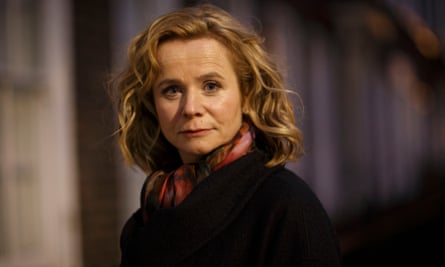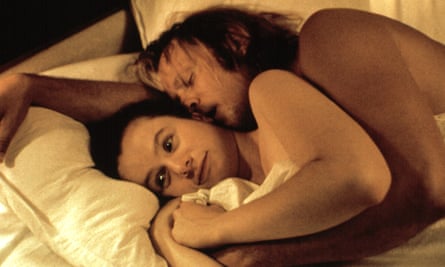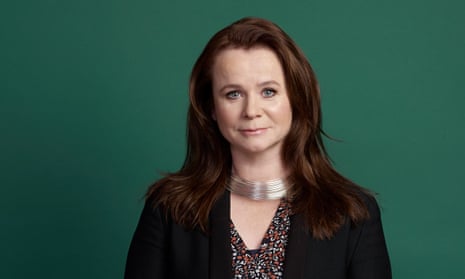For Emily Watson, 2017 has been bookended in starkly contrasting styles. She started the year having wild sex in a House Of Commons broom cupboard in BBC One’s hit psychological thriller Apple Tree Yard. She finishes it in a much more wholesome role as much-loved matriarch Margaret “Marmee” March in a three-part Christmas TV adaptation of Louisa May Alcott’s Little Women. In between all the steamy scenes and bonnet-wearing, Watson also turned 50.
The Shakespearean stage actress came relatively late to the screen, making her film debut aged 29 in Lars von Trier’s 1996 drama Breaking the Waves (when Helena Bonham Carter pulled out at the last minute). She won an Oscar nomination for that film and was nominated again two years later for her role as cellist Jacqueline du Pré in Hilary and Jackie. She won a Bafta for playing a social worker in ITV’s Fred West drama Appropriate Adult and has an OBE for services to drama.
Once describing herself as “a character actor who gets laid”, when we talk she’s articulate, contemplative and full of mischievous wit while discussing everything from parenting to petticoats, Oscar Wilde to Arsène Wenger.
Were you a fan of Little Women when you were young?
I absolutely loved it. Certain events from the novel are seared into my childhood memory. I’m sure that’s the same for many readers. When Amy burns Jo’s book then falls through the ice – all those terrible, traumatic, shocking scenes. It was fascinating to reread as an adult. And then that awful, heart-rending sense of grief over Beth. Heidi Thomas [Call the Midwife creator and writer of the new adaptation] hasn’t shied away from that at all.
What did you make of Marmee second time around?
I was wonderfully taken with her, actually. She’s such an inspirational parent, whereas I just despair of myself [Watson is mother to Juliet, 12, and Dylan, nine]. The March family lead a considered life, very mindful of what it means to be good human beings. The first thing we see them do is give away their Christmas meal to refugees, which would still be a striking thing to do today. It wouldn’t go down well in my house [laughs]. She teaches her girls to be thoughtful citizens of the world.
How else is she inspirational?
She also has another great parenting skill to which I aspire: the ability to step back, let her children make mistakes and wait for them to come to her. In our age of helicopter parenting, where everything gets micro-managed, that’s a joy to read, even though I won’t ever reach her lofty heights.
Marmee’s quite a saintly character. Was it tricky to bring her to life?
What I love about her is when she talks to Jo about her terrible temper. Marmee tells her, “I used to have a temper just like yours but I’ve learned to control it. I’m still angry every day of my life but I’ve learned not to show it.” That’s the key to her character. She’s done work on herself, she’s mindful of how she comes across to her children.
Is that something you can relate to? Are you angry every day?
Yeah. I can get very short-tempered, I’m afraid.
Did you feel maternal towards the four rising stars who play the March sisters?
Very much. They were four very interesting young actresses with intelligent minds. Often in this industry, you come across young people who are very commercial-minded. Ambitious and all about climbing the greasy pole. This felt different. We had an intense rehearsal period where we shared lots about ourselves and it was a strong bonding experience.
How were the senior cast members, Michael Gambon and Angela Lansbury?
It was like having royalty on set. I didn’t get any scenes with Michael, sadly, but we hung out a bit, which was a thrill and such a privilege. Angela is 92 but sharp as a whip. Nothing gets past her. An amazing, inspirational woman.
What was it like wearing 1840s outfits?
Oh my God, so heavy. Too many petticoats. We were trying to convey the impression of an active life – fending for yourself, chopping wood, cooking – and it was exhausting. Turning mattresses when you’re wearing 30lb of petticoats is no fun. Thank goodness for progress.
Would you say it’s a feminist story?
Of its time, yes. It puts young women front and centre. The March sisters are raised to work and take their place in the world. It’s a very different sentiment to, say, Jane Austen, where young women are out to catch a husband for money. These girls want to marry for love and work to live.
It’s shot in a Sofia Coppola-esque naturalistic style…
It doesn’t look like a BBC chocolate box version, which is pleasing. Ness [director Vanessa Caswill] has a unique eye. She’s very connected to the young female body, that feeling of the blood running through young women’s veins. There’s an earthy, innocent freshness to it. And it was shot in County Wicklow, which was certainly handier than Massachusetts.
Were you surprised by how talked about Apple Tree Yard became this year?
I was delighted, because I’d hoped it would strike a chord. I hadn’t had a chance in a while to take out my inner lion and gallop for a good stretch like that. The BBC marketed it cleverly and told us we weren’t allowed to talk about anything beyond episode one. It annoyed me at the time but was a smart move. Viewers thought they were sitting down to watch a steamy, middle-aged romance, but it turned into something more provocative and unsettling.

You were already good friends with your co-star, Ben Chaplin. Did that make the sex scenes easier?
It meant we weren’t embarrassed, so could talk it through and scientifically plot the scenes to make them seem real. It’s quite a strange thing to do, but we all have to make a living.
How do you reflect on the rape scene?
It wasn’t graphic but very emotionally realistic, which made it difficult to watch. There wasn’t a single bit of lace or bra strap, but it was all about the psychological peril of rape. People felt affected by that. We took the fallout seriously.
Was it a rare treat to play not just a female scientist but a sexually active mature woman?
In film, those roles don’t really exist for women my age, but in television that’s definitely changing. The way we consume TV is evolving rapidly. It’s like going to the bookshop now, where you choose the thing you want to read. Half that audience is female and they’re going to make powerful choices. So many issues are emerging about how women are affected by the power balance in this industry. More female-driven stories will eventually lead to equal pay, respect, all sorts of changes. That’s driven by audiences, by people’s perceptions of the industry and by brave individuals who are making changes.
Will recent revelations be a turning point?
I really hope so. There’s an awful lot happening at the moment that needs to be dealt with calmly, carefully and patiently – but it could lead to fundamental change and be very positive.

Have you ever experienced sexual harassment at work?
No, I’ve been very lucky. I entered the industry at quite an unusual level. My first film was Breaking the Waves, aged 29, so I went into the film business with a bit of clout. People didn’t mess with me. I wasn’t ever as vulnerable as a novice teenage actress might be – or maybe I just have that vibe. Fierce, I think it’s called. Although you shouldn’t have to be fierce to be safe in your workplace.
Lars von Trier directed Breaking the Waves. Did Björk’s recent allegations against him surprise you?
Yes. The man is obviously eccentric and his work is quite extreme, but I was never treated with anything other than respect. I can’t speak for others, though. It’s incredibly brave of people to come forward. But there’s a massive range of allegations, from the clearly criminal to much milder. We can’t put everyone in the same bracket. People still have a right to presumption of innocence and due process. It’s become a rolling media storm but it would be disrespectful to the women who have been brave enough to come forward if it wasn’t treated with the seriousness it deserves.
You turned 50 this year. Did you celebrate?
Yes. It felt great, as if a lot of perplexing issues about being younger were ticked off. I was, like, so where’s the party?
You’re an Arsenal fan. Do you go to many games?
No, I’m an armchair supporter. But I’m definitely Wenger in. Loyalty and longevity. The man’s got an enormous amount of dignity, unlike most people in his profession.
Do you ever get mistaken for Emma Watson?
Only once. A load of old ladies in Mexico wanted my autograph and said I was wonderful in Harry Potter. I can only assume they hadn’t actually seen it.
Next up, you’re in The Happy Prince – the Oscar Wilde biopic written, directed by and starring Rupert Everett. That must have been fun…
Brilliant. Rupert is so immersed in that character. He played Wilde on stage for a long time, so lives and breathes it. I play his wife, Constance, which was lovely. We’re old friends and had such a laugh.
What else is coming up?
On Chesil Beach, but blink and you’ll miss me. Saoirse Ronan plays the lead and I love her. She’s an amazing young actress and carries the film beautifully. I’ve just finished King Lear with Anthony Hopkins and directed by Richard Eyre. That’ll do for the moment, I think.
Are you home for a family Christmas?
Yes, thankfully. I’ve done a long tour of duty but I’m finally home, ironing school uniforms and just being mum. Me and my husband [playwright Jack Waters] will tag-team on the cooking, then we’ll all sit down to watch Little Women. It’s one of the very few things I’ve done that my kids can watch [laughs]. My daughter’s reading the book at the moment. She’s got all the trauma to come!
Little Women is on BBC One from 26 to 28 December
